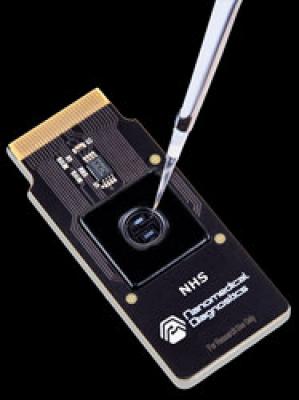Nanomedical Diagnostics recently announced the launch of the new graphene-enhanced NHS Agile biosensor chip. The new chip reportedly reduces the number of steps needed to gain kinetic binding data for a wide range of molecules, including small and large molecules, peptides, proteins, and antibodies. NHS biosensors are designed for use on the company’s Agile R100 label-free personal assay system.

Many pharmaceutical companies have established protocols for studying molecules using standard amine-linker chemistry, noted Nanomedical Diagnostics' CEO. However, traditional methods using these protocols require numerous steps on complicated machines that make experiments difficult to run and prone to variability. Our new NHS biosensor combined with the single-sample format Agile R100 allows researchers to leverage these tried and true techniques, but reduces the process greatly compared to prior systems. Both experiment complexity and results variability are decreased, which gives all researchers the ability to gain reliable label-free kinetic binding data for their molecules at their benchtop, on their schedule.
Agile R100 is said to be the first kinetic characterization platform built with proprietary Field Effect Biosensing (FEB) technology, a breakthrough electrical technique for measuring biomolecular interactions in real-time. Unlike SPR- and BLI-based assays which have a limited ability to sense in complex samples, FEB measures changes in conductance instead of mass and is unaffected by solvents or detergents that interfere with optical readings. This provides researchers access to the first truly novel label-free technique in decades.
The NHS Agile Biosensor Chip has pre-activated amine-linker chemistry that enables rapid immobilization of any molecule with a free amine group, allowing for flexible, fast kinetic characterization using a wide range of target classes. Like all Agile biosensors, the NHS chips provide up to 10 measurements with just 10 µL drops of sample, enabling entire dose-response curves to be run with one chip, increasing cost-efficiency. Agile R100’s single-sample format lets researchers apply sample directly to the sensor surface, making the platform easy to run with little training.